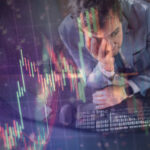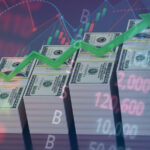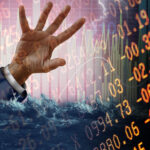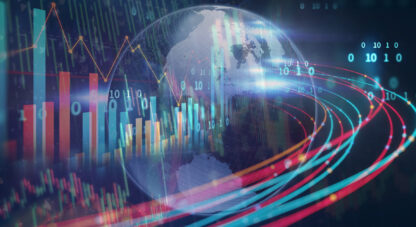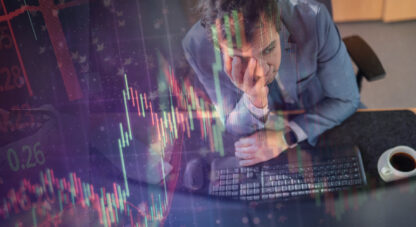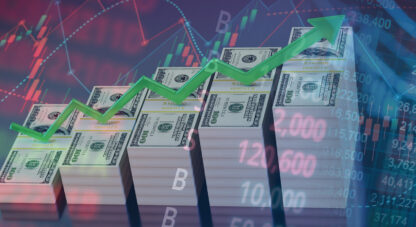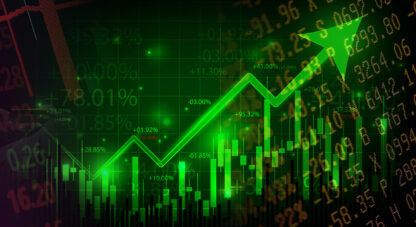February 25 – Associated Press (Yuras Karmanau, Jim Heintz, Vladimir Isachenkov, Dasha Litvinova): “Russian troops stormed toward Ukraine’s capital early Saturday, and street fighting broke out as city officials urged residents to take shelter. The country’s president refused an American offer to evacuate, insisting that he would stay. ‘The fight is here,’ he said.”
February 25 – Reuters (Idrees Ali and Phil Stewart): “Russia is facing more resistance than Moscow anticipated in its invasion of Ukraine, including in its advance on the capital, Kyiv, and appears to have lost some of its momentum, a senior U.S. defense official said on Friday. Russian missiles pounded Kyiv on Friday, families cowered in shelters and authorities told residents to prepare Molotov cocktails to defend Ukraine’s capital from an assault that the mayor said had already begun with saboteurs in the city… ‘We do assess that there is greater resistance by the Ukrainians than the Russians expected,’ the senior defense official said, adding Ukraine’s command and control of its military ‘remains intact’. ‘They are not moving on Kyiv as fast as what we believe they anticipated they would be able to do. That said, they continue to try to move on Kyiv…’ Ukraine’s military was putting up a fight, the official said. ‘They are fighting for the country,’ the official said, noting that Russia had yet to establish control of the airspace above Ukraine or used the extent of its electronic warfare capabilities.”
February 25 – CBS News: “The war in Ukraine is taking a devastating toll on the country’s civilians. Just 48 hours ago, they could not have imagined what they’d be forced to endure. CBS News senior foreign correspondent Holly Williams said the mayor of the country’s second largest city warned citizens to seek shelter as Kharkiv became the focus of a fierce fight between Russian forces and Ukrainians trying to defend it. Russia claims it isn’t targeting civilians, but Ukrainian officials said a Russian missile hit an apartment building in the town of Chuhuiv, just outside Kharkiv, killing a teenage boy and injuring 15 residents… On Thursday night, an exhausted looking Ukrainian President Volodymyr Zelensky accused Russia of aiming at civilians, and he said he and his own young family were the top targets. Officials say Zelensky remains in Ukraine, but they won’t say where.”
February 25 – The Sun (Imogen Braddick and Will Stewart): “Thirteen Ukrainian soldiers bravely told a Russian warship to ‘go f**k yourselves’ before they were brutally massacred after refusing to surrender. The defiant border guards had been tasked with protecting Snake Island in the Black Sea from Russian invaders after Moscow launched a full-scale invasion of Ukraine. When the troops faced an ultimatum from the Russians to surrender and give up the strategic island, the guards fearlessly told them to ‘f**k off’. In a radio message from the vessel, the Russian soldiers warned the guards: ‘This is Russian military warship. I suggest you lay down your weapons and surrender to avoid bloodshed and needless casualties. Otherwise, you will be bombed.’ But the Ukrainian troops defiantly refused to give up the territory, and replied: ‘Go f**k yourselves!’ The Russians were reportedly heard swearing back at the Ukrainians – before all 13 border guards were massacred in an aerial bombardment.”
February 25 – The Sun (Adrian Zorzut): “A hero Ukrainian soldier has selflessly blown himself up to destroy a bridge and stop Russian forces from storming in from Crimea. Ukraine’s armed forces confirmed that Vitaly Skakun Volodymyrovych died while trying to fend off a column of Russian tanks at the Henichesk bridge, Kherson region. The brave trooper decided to blow up the bridge – which connects Russian-occupied Crimea with mainland Ukraine – after volunteering to carry out the dangerous mission of mining it with explosives, an Armed Forces official said… ‘According to his brothers in arms, Vitaly got in touch [with them] and said he was going to blow up the bridge. Immediately after an explosion rang out.’ Skakun, a military engineer, is being hailed by his comrades for ‘significantly slowing down the advancement of the enemy’. It also allowed Ukrainian military units to regroup and redeploy its defences.”
February 25 – The Guardian (Adam Gabbatt): “A video which apparently shows a Ukrainian man attempting to block a Russian military convoy has gone viral online, with comparisons being drawn to the ‘tank man’ of Tiananmen Square. The 30-second clip, shared by Ukrainian news outlet HB, shows a man standing in front of what appear to be military vehicles. As the vehicles try to swerve around him, the man jockeys to the side, seemingly in an attempt to block their progress.”
February 25 – CBS News (Charlie D’Agata, Justine Redman, and Haley Ott): “Ukraine’s Minister of Defense had issued a call for civilians between 18 and 60 to take up arms to help defend the country, but on Friday, as Russian troops got closer to the center of the city, he asked anyone over the age of 18 to volunteer… CBS News saw a steady stream of people entering one makeshift recruitment center in Kyiv on Friday morning, ready to join the fight. ‘This is my country. I have my family here, and I have a duty to protect my family and to protect my country. And this is the duty of each and every Ukrainian,’ 44-year-old Georgiy, a mapmaker by trade who was arriving to help defend Kyiv, told CBS News. When asked if Ukraine was ready to fight, he said: ‘We will fight as much as we can. We will fight because we have our families… our country and our lifestyle that we are not ready to give up.’ A commander at the center… told CBS News that thousands of people had arrived to fight, but that many did not have any military experience. He said there were not enough guns to go around. ‘Citizens of Kyiv are gathering here. They are receiving weapons here and guidelines how to run urban combat, how to provide medical first aid, and how to destroy Russians and take their weapons,’ he said.”
“You can veto this resolution, but you cannot veto our voices. You cannot veto the U.N. charter. You cannot veto the Ukrainian people. You cannot veto accountability.” Linda Thomas-Greenfield, U.S. ambassador to the United Nations, speaking to the Russian U.N. representative following Russia’s veto of a U.N. resolution condemning Russia’s invasion of Ukraine and calling for an immediate troop withdrawal.
February 24 – The Sun (Pjotr Sauer and Andrew Roth): “Vladimir Putin has said there is broad public support for the invasion of Ukraine that he announced just before dawn on Thursday morning. But by evening, thousands of people in cities across Russia had defied police threats to take to central squares and protest against the military campaign. Police had made at least 1,702 arrest in 53 Russian cities as of Thursday evening…, as they cracked down on the unsanctioned protests. Most of the arrests were made in Moscow and St Petersburg, where the crowds were largest. The protesters chanted: ‘No to war!’ as they exchanged shocked reactions to the attack on Ukraine. In Moscow, Alexander Belov said he thought that Putin had ‘lost his mind’. ‘I thought that we would never see a war like this in the 21st century,’ said Belov… ‘It turns out we live in the Middle Ages.’ The mood in Moscow was dark and sombre hours after Putin had announced that he was launching a broad military offensive targeting Ukraine. ‘I am embarrassed for my country. To be honest with you, I am speechless. War is always scary. We don’t want this,’ said Nikita Golubev, a 30-year-old teacher. ‘Why are we doing this?’”
February 24 – The Quint: “Jailed Russian opposition leader and anti-corruption activist Alexei Navalny said on Thursday… that he was against President Vladimir Putin’s invasion of Ukraine, reported AFP. In a video published by independent news outlet Dozhd, Navalny said, ‘I am against this war,’ as he stood trial from prison on Thursday… Wearing a prison uniform, Navalny can be heard saying: ‘This war between Russia and Ukraine was unleashed to cover up the theft from Russian citizens and divert their attention from problems that exist inside the country.’”
“Russian lawmaker Mikhail Matveyev, who voted to recognize Donetsk and Luhansk, calls for an immediate end to attack on Ukraine: I voted ‘for Russia to become a shield… not for Kyiv to be bombed.’” February 25, 2022 (BNO News)
February 25 – inews (Graham Keeley): “In an act of rebellion against the Putin government, Russian daily Novaya Gazeta said it would publish editions in Russian and Ukrainian. Its front page on Friday read: ‘Russia. Bombs. Ukraine.’ Editor Dmitri Murátov, winner of the Nobel Peace Prize in 2021, wrote: ‘Together with pain, we feel a sense of shame. What is the next step? A nuclear war? Only a Russian opposition movement against the war can save the life of this planet.’”
February 25 – ESPN: “Russian tennis player Andrey Rublev wrote ‘No War Please’ on a TV camera moments after advancing to the final at the Dubai Championships on Friday. The seventh-ranked Rublev had just beaten Poland’s Hubert Hurkacz… in their semifinal match before writing his message on the camera… ‘In these moments, you realize that my match is not important. It’s not about my match, how it affects me,’ Rublev said… ‘What’s happening is much more terrible.’”
“One person’s terrorist is another’s freedom fighter,” as they say. The battle of “Good Versus Evil” rarely presents itself as clearly as in the movies. Yet this is indeed a rare moment in history: what is being inflicted upon the innocent Ukrainian people is an absolute travesty. If this is not an act of pure evil, then I struggle with what might meet the definition. To be sure, the two-decade debate on Putin’s character and the risk he presents to the world has been resolved. “Unilateral aggression and crimes against humanity,” as aptly and succinctly stated by Ian Bremmer.
This is happening too often. Two years ago, I asserted the pandemic was a history-changing development. It wasn’t clear how, but I feared (after witnessing shock and awe monetary and fiscal stimulus) that a major global pandemic erupting at the critical “Terminal Phase” of a historic Bubble period would come with momentous consequences. I’ll again admit to a cloudy crystal ball. But the world changed decisively for the worse with Thursday’s Russian invasion of Ukraine. This time, a historic development – the largest European war since WWII – erupts at the dawn of what I anticipate will evolve into the greatest global down cycle since the Great Depression. A new global “iron curtain.” A grim New Age “cold war” – at best.
Of course, the U.S. government and its allies have made their share of mistakes over the years. Should the U.S. and NATO be condemned for opening membership to Eastern European countries? Or did we witness this week why it’s been imperative to offer security against a deceitful and dangerous Russian leader? It’s an awfully complex world.
This week, the expanding global fissure turned more glaring. “Axis of Evil” is perhaps too strong. But there is now a more distinct line that separates divergent views on morality. Autocracy vs. Democracy. I don’t believe China is “evil,” but this week Beijing further demonstrated that it operates with an impaired moral compass.
February 23 – Washington Examiner (Joel Gehrke): “China has given ‘tacit approval’ for Russian President Vladimir Putin’s latest invasion of Ukraine, in the judgment of U.S. officials, as part of a joint effort to undermine the institutions that American and allied leaders established to minimize conflict in the decades following World War II. ‘Russia and the PRC also want a world order,’ State Department spokesman Ned Price said… ‘But this is an order that is and would be profoundly illiberal. … It is an order that is, in many ways, destructive rather than additive.’ China and Russia have made a show of their alignment over the last several years, culminating in the release this month of a communique that outlined a wide range of plans for economic and diplomatic cooperation — including the Kremlin’s support for Beijing’s claim to sovereignty over the island democracy of Taiwan and Chinese General Secretary Xi Jinping’s support for restrictions on NATO activities in Europe. Price declined to draw an explicit inference from that statement that China supports Russia in the brewing war, though his Defense Department counterpart didn’t shy from voicing an ominous conclusion.”
February 25 – Bloomberg: “Chinese state media left Russia’s invasion of Ukraine off their front pages Friday as Beijing weighed its response, even as the outbreak of war in Europe dominated conversations on Chinese social media. People’s Daily, the mouthpiece of the Communist Party, put the war on the bottom of page three on Friday, carrying a small piece on Foreign Minister Wang Yi’s call with his Russian counterpart and criticism of the U.S. for ‘hyping’ a military offensive that British Prime Minister Boris Johnson called the biggest conflict in Europe since 1945. The official Xinhua News Agency’s website on Friday morning relegated the crisis, which Japanese Prime Minister Fumio Kishida said ‘struck at the very core foundation of our international order,’ to a bullet on the site. In its media section, it showed people in the Ukrainian capital, Kyiv, going about daily life. While state broadcaster CCTV had some on-the-ground coverage, the front page of its app didn’t mention Ukraine. A story by state-backed news site Jiemian, titled ‘The most difficult day for Ukrainians,’ was censored within hours.”
The world has changed so profoundly since President George H.W. Bush assembled a coalition of nations to remove Saddam Hussein’s forces from Kuwait (“Operation Desert Storm”). Saddam didn’t possess nukes, so the world was not intimidated. Putin commands thousands of nuclear bombs, along with advanced hypersonic missile technology. Moreover, he is certainly these days not shy with threats. AP headline: “Putin Waves Nuclear Sword in Confrontation with the West.” This week, for the first time, there was every reason to believe he might be mad enough to actually use them. “Fuhrer 2022” – with a photoshopped Putin sporting a Hitler mustache – found a home on the Drudge Report.
There will be only losers in the Russia/Ukraine War. For Ukraine, catastrophic losses appear unavoidable. An independent nation is at the brink of collapse and dissolution at the hands of the military of a foreign dictator. This is not my area of expertise, but Russia is already a loser. Putin gambled and lost. I can only presume he expected the Ukrainians to roll over at the prospect of being mowed down by the great Russia military machine. Perhaps he thought President Volodymyr Zelenskyy – the former comedian and actor – would hastily flee with his cabinet to the Swiss Alps. And with no functioning Ukrainian government, surely the Ukrainian people would succumb with minimal bloodshed.
Honor holds a special place in my heart. It’s a hardwiring issue: my eyes well up. In the heat of battle, Zelenskyy is demonstrating extraordinary courage and leadership. The neophyte politician is in an exclusive club (seemingly of one): A National Leader Willing to Face Down Putin. And it’s difficult to believe Putin saw this coming – and it makes a tremendous difference. This is not Crimea circa 2014. The Ukrainian military is fighting ferociously – against all odds. David vs. Goliath. Loyalty and Honor. Heroes everywhere. The Ukrainian people are an inspiration.
“I think this is the time where we need to, at the invitation of Ukraine, declare Ukraine a no-fly zone enforced by NATO and the United States. We certainly have the capability to do that. The air space is still contested by the Ukrainians. We can shut down Russian air operations, even if we don’t directly engage Russian troops on the ground… Vladimir Putin has threatened the use of nuclear weapons. That shows you how dangerous this man is. And he only stops when his bayonet hits a brick wall. The United States and NATO must be that brick wall tonight. I would love to see us declare at the invitation of Ukraine that Ukraine is a no-fly zone, and we will enforce that. I’ve got to tell you, for anybody that thinks that somehow we’re going to be equally matched with Russia – NATO and the United States would crush Russia in the air in a second.” Congressman Adam Kinzinger, appearing on CNN, February 25, 2022.
“I once again appeal to the military personnel of the armed, do not allow the Neo-Nazis and Banderities (Ukrainian radical nationalists) to use your children, wives, and elders as human shields. Take power into your own hands, it will be easier for us to reach an agreement with you rather than with this band of drug addicts and Neo-Nazis who sat in Kyiv and took all of the people of Ukraine hostage.” Vladimir Putin, February 25, 2022
These are not the words of a rational man. Contrived to intimidate? PSYOPS? Or might Putin be losing touch with reality. There is talk of possible negotiations between Russia and the Ukraine leadership. We can only hope, though at this point Russia will demand complete surrender and the establishment of a puppet government. Each day the Ukrainians hold out the greater the pressure on U.S. and European governments to provide military assistance. And the more damage inflicted upon Russian troops by American weapons (i.e. tank-destroying rockets and Javelins), the more frustrated, belligerent and unpredictable Putin becomes.
“A New Cold War, or the Start of World War III?” “Russia-Ukraine Crisis: How Likely is it to Escalate into Broader War?” “‘I Just Hope This is Not the Beginning of World War III,’ says Rep. Michael McCaul.” “Will the Ukraine Conflict Go Nuclear?” “Is This the Start of World War III or Cold War II?” “Sen. Lindsey Graham Warns of World War III if Putin, China and Iran ‘Get Away With It’”
I don’t ever recall a week with such frightening headlines. I find it particularly troubling to see China grouped with Russia and Iran. Having gambled on Putin, Xi and China were big losers this week.
February 23 – Bloomberg: “China expressed opposition to sanctions against Russia and criticized the U.S. for inflaming the Ukraine crisis, suggesting its support for NATO’s expansion had left President Vladimir Putin with few options. Beijing didn’t view sanctions as ‘the best way to solve problems,’ Foreign Ministry spokesperson Hua Chunying said… She also criticized the U.S. and the North Atlantic Treaty Organization for placing offensive weapons near Russia, asking whether ‘they ever thought about the consequences of cornering a major power.’ Hua called the U.S. the ‘culprit’ of the Ukraine situation, saying it was ‘adding oil to a burning house while pointing fingers at others trying to put out the fire.’ ‘This act is irresponsible and immoral,’ she said of the U.S. moves.”
The U.S. is the “culprit” and “immoral.” China refused to even call it an invasion, let alone denounce Russia’s aggression. China has chosen sides, and an already fractured U.S. relationship is on a deep downward spiral after the week’s developments.
February 25 – New York Times (Edward Wong): “Over three months, senior Biden administration officials held half a dozen urgent meetings with top Chinese officials in which the Americans presented intelligence showing Russia’s troop buildup around Ukraine and beseeched the Chinese to tell Russia not to invade… Each time, the Chinese officials, including the foreign minister and the ambassador to the United States, rebuffed the Americans, saying they did not think an invasion was in the works. After one diplomatic exchange in December, U.S. officials got intelligence showing Beijing had shared the information with Moscow, telling the Russians that the United States was trying to sow discord — and that China would not try to impede Russian plans and actions, the officials said. The previously unreported talks between American and Chinese officials show how the Biden administration tried to use intelligence findings and diplomacy to persuade a superpower it views as a growing adversary to stop the invasion of Ukraine, and how that nation, led by President Xi Jinping, persistently sided with Russia even as the evidence of Moscow’s plans for a military offensive grew over the winter… Some American officials say the ties between China and Russia appear stronger than at any time since the Cold War. The two now present themselves as an ideological front against the United States and its European and Asian allies, even as Mr. Putin carries out the invasion of Ukraine, whose sovereignty China has recognized for decades. The growing alarm among American and European officials at the alignment between China and Russia has reached a new peak with the Ukraine crisis… In the recent private talks on Ukraine, American officials heard language from their Chinese counterparts that was consistent with harder lines the Chinese had been voicing in public, which showed that a more hostile attitude had become entrenched, according to the American accounts.”
Without China’s partnership, Putin doesn’t risks the onerous sanctions that the invasion would provoke. Now China will provide Russia a lifeline, surely subverting western sanctions. I’ll assume the U.S. and the “non-autocratic” block will rally around Taiwan’s independence. And the world will be watching for Beijing to begin tightening the noose. Xi will try to appear more balanced, working to play a constructive diplomatic role in Russia/Ukraine negotiations. Yet the damage is done. Xi and Putin are partners – with “no limits”.
It is undoubtedly a new world order in the making. It’s a deeply troubling world; an unstable world. It points to a world of market, financial, economic and geopolitical instability. After this week, both inflation and risk look persistently higher. Defense spending looks much higher. “Globalization” took another major blow. Energy and food independence became more pressing issues. And the unfolding bipolar world will see less trade and cooperation between competing, and increasingly hostile, blocks. The Confluence of Inflation and Fragility: A Central Banker’s Nightmare. It was one wild week for acutely unstable global markets, but we’ll leave that for another day.
And if I were selling subscriptions or using an email list, this is where the cancellations come. Here it goes: I guess I’m a traditionalist. As Americans, during a crisis we would rally around the President. This is not the time – the era – to crave – to strive – for his failure. There’s no Honor in that. Most regrettably, we today have our own domestic “iron curtain” and “cold war” mentality. This will not serve us well.
For the Week:
The S&P500 increased 0.8% (down 8.0% y-t-d), while the Dow was little changed (down 6.3%). The Utilities rallied 1.9% (down 6.7%). The Banks declined 0.9% (up 2.8%), and the Broker/Dealers slipped 0.8% (down 0.1%). The Transports recovered 1.6% (down 7.7%). The S&P 400 Midcaps gained 1.1% (down 6.3%), and the small cap Russell 2000 advanced 1.6% (down 9.1%). The Nasdaq100 rallied 1.3% (down 13.1%). The Semiconductors jumped 2.0% (down 12.5%). The Biotechs increased 0.9% (down 9.8%). With bullion declining $9, the HUI gold index dipped 0.8% (up 8.4%).
Three-month Treasury bill rates ended the week at 0.2875%. Two-year government yields jumped 10 bps to 1.57% (up 84bps y-t-d). Five-year T-note yields gained five bps to 1.87% (up 60bps). Ten-year Treasury yields increased three bps to 1.96% (up 45bps). Long bond yields added three bps to 2.28% (up 37bps). Benchmark Fannie Mae MBS yields increased three bps to a 31-month high 2.92% (up 85bps).
Greek 10-year yields dipped a basis point to 2.56% (up 124bps y-t-d). Ten-year Portuguese yields added two bps to 1.10% (up 64bps). Italian 10-year yields were little changed at 1.83% (up 66bps). Spain’s 10-year yields increased one basis point to 1.21% (up 65bps). German bund yields rose four bps to 0.23% (up 41bps). French yields added two bps to 0.71% (up 51bps). The French to German 10-year bond spread narrowed two to 48 bps. U.K. 10-year gilt yields jumped eight bps to 1.46% (up 49bps). U.K.’s FTSE equities index slipped 0.3% (up 1.4% y-t-d).
Japan’s Nikkei Equities Index fell 2.4% (down 8.0% y-t-d). Japanese 10-year “JGB” yields declined a basis point to 0.21% (up 14bps y-t-d). France’s CAC40 dropped 2.6% (down 5.6%). The German DAX equities index sank 3.2% (down 8.3%). Spain’s IBEX 35 equities index declined 1.2% (down 2.6%). Italy’s FTSE MIB index dropped 2.8% (down 5.8%). EM equities were mostly under pressure. Brazil’s Bovespa index increased 0.2% (up 7.9%), and Mexico’s Bolsa gained 0.5% (down 1.4%). South Korea’s Kospi index slumped 2.5% (down 10.1%). India’s Sensex equities index dropped 3.4% (down 4.1%). China’s Shanghai Exchange declined 1.1% (down 5.2%). Turkey’s Borsa Istanbul National 100 index dropped 3.9% (up 5.1%). Russia’s MICEX equities index collapsed 27.2% (down 34.8%).
Investment-grade bond funds saw outflows of $755 million, and junk bond funds posted negative flows of $966 million (from Lipper).
Federal Reserve Credit last week jumped $27.0bn to a record $8.886 TN. Over the past 128 weeks, Fed Credit expanded $5.159 TN, or 138%. Fed Credit inflated $6.074 Trillion, or 216%, over the past 485 weeks. Elsewhere, Fed holdings for foreign owners of Treasury, Agency Debt last week added $1.4bn to $3.449 TN. “Custody holdings” were down $98.6bn, or 2.8%, y-o-y.
Total money market fund assets increased $5.0bn to $4.555 TN. Total money funds increased $211bn y-o-y, or 4.8%.
Total Commercial Paper dipped $2.7bn to $1.020 TN. CP was down $69.2bn, or 6.4%, over the past year.
Freddie Mac 30-year fixed mortgage rates declined three bps to 3.89% (up 92bps y-o-y). Fifteen-year rates slipped a basis point to 3.14% (up 80bps). Five-year hybrid ARM rates were unchanged at 2.98% (down 1bp). Bankrate’s survey of jumbo mortgage borrowing costs had 30-year fixed rates up five bps to 4.25% (up 107bps).
Currency Watch:
For the week, the U.S. Dollar Index increased 0.6% to 96.62 (up 1.0% y-t-d). For the week on the upside, the Norwegian krone increased 1.8%, the New Zealand dollar 0.7%, the Australian dollar 0.7%, and the Swedish krone 0.1%. On the downside, the British pound declined 1.3%, the Singapore dollar 0.5%, the South Korean won 0.5%, the euro 0.5%, the Japanese yen 0.5%, the Swiss franc 0.4%, the Mexican peso 0.3%, the Brazilian real 0.3%, and the South African rand 0.1%. The Chinese renminbi increased 0.13% versus the dollar (up 0.61% y-t-d).
Commodities Watch:
The Bloomberg Commodities Index added 0.7% (up 13.3% y-t-d). Spot Gold dipped 0.5% to $1,889 (up 3.3%). Silver rose 1.5% to $24.27 (up 4.1%). WTI crude increased 52 cents to $96.62 (up 22%). Gasoline jumped 2.2% (up 22%), and Natural Gas gained 0.9% (up 20%). Copper declined 0.9% (up 1%). Wheat surged 6.9% (up 12%), and Corn added 0.5% (up 11%). Bitcoin dropped $862, or 2.1%, this week to $39,480 (down 15%).
Russia/Ukraine Watch:
February 24 – The Atlantic (Michael Schuman): “As Russian tanks roll over Ukraine, Vladimir Putin’s crisis will reverberate around the world, possibly most dangerously in the Taiwan Strait. An attempt by Beijing to claim Taiwan by force has just become more likely. That’s not necessarily because there is a direct link between Putin’s invasion of Ukraine and Beijing’s menacing of Taiwan, but because the war for Ukraine is the most unfortunate indication yet of the frightening direction of global geopolitics: Autocrats are striking back.”
February 21 – Financial Times (Max Seddon): “For Vladimir Putin’s extraordinary meeting with his top security officials on Monday, he chose the Kremlin’s ornate Hall of the Order of St Catherine. Designed by the tsars to show off the glories of Russia’s empire, the setting perfectly underscored how much the president has come to resemble his autocratic forebears of old. In a made-for-TV spectacle, Putin asked his subordinates one after the other to make the case for recognising two separatist-held territories in eastern Ukraine — a move the west fears could mark the start of a war between Moscow and Kyiv… As he did so even his longest-serving allies looked terrified. Telling him what they evidently thought he wanted to hear, mostly repeating baseless claims from state television, they looked less like a sounding board than an imperial court.”
February 21 – Financial Times (Max Seddon, Henry Foy and Demetri Sevastopulo): “Vladimir Putin has ordered troops into eastern Ukraine after recognising two Moscow-backed separatist regions, hobbling the prospects of a diplomatic solution to the crisis as he put his country on a war footing. The Russian president directed his military to enter rebel-held Donetsk and Luhansk regions in Ukraine’s Donbas border area for ‘peacekeeping’ operations after signing decrees pronouncing their independence. The decrees and military order sparked international condemnation as the US and European allies vowed to respond with sanctions, and Volodymyr Zelensky, Ukraine’s president, accused Russia of violating its sovereignty.”
February 22 – Wall Street Journal (James Marson, Evan Gershkovich and Alan Cullison): “Russian President Vladimir Putin’s combative address Monday from the Kremlin was a nearly hourlong recitation of decades worth of historical grievances and an unmistakable challenge by Moscow to the post-Cold War international order dominated by the West. The speech, ostensibly aimed at recognizing the independence of two breakaway statelets that Russia carved from Ukraine in 2014, outlined Mr. Putin’s view that Ukraine was a historical accident that the U.S. has turned into a launchpad to attack Russia. ‘The United States and NATO have begun the shameless development of the territory of Ukraine as a theater of military operations,’ Mr. Putin said, seated at a desk flanked by Russian flags.”
February 23 – Bloomberg (Arne Delfs, Ewa Krukowska and Isis Almeida): “Russia’s controversial Nord Stream 2 gas pipeline is all but dead. At least for now. German Chancellor Olaf Scholz effectively froze the $11-billion link’s approval process by having the Economic Ministry withdraw its assessment that the project doesn’t pose a threat to security of supply. Without that, the operator of the pipeline connecting Russia to Germany bypassing Ukraine cannot obtain the certification needed to start operations.”
China/Russia Watch:
February 24 – Newsweek (John Feng): “China leaned heavily into Russia’s camp in the wake of Vladimir Putin’s attack on Ukraine on Thursday, with Beijing’s top diplomat calling his counterpart in Moscow but shunning his opposite number in Kyiv. In an unprecedented Chinese Foreign Ministry press conference that lasted for over an hour, its senior spokesperson, Hua Chunying, told reporters that China’s leaders hadn’t made contact with Ukrainian officials in the hours after Russian forces were ordered across the border for a multi-front offensive. ‘Everybody is busy now,’ Hua said. At the start of the event, she balked at the term ‘invasion’ and said Beijing wouldn’t ‘rush into a conclusion” about the nature of the ongoing military offensive.’”
February 23 – Reuters (David Brunnstrom and Michael Martina): “The United States… accused China and Russia of working together to create a new ‘profoundly illiberal’ world order of which Moscow’s actions towards Ukraine were just a part. U.S. State Department spokesman Ned Price said every responsible country in the world, including China, had an obligation to urge Russian President Vladimir Putin to back down and de-escalate the Ukraine crisis. ‘You will have to ask the PRC whether they have used their own considerable influence with the Russian Federation to that end,’ Price said at a regular news briefing in reference to the People’s Republic of China.”
February 23 – Financial Times (Edward White and Kathrin Hille): “China is ready to throw Russia an economic lifeline as Vladimir Putin’s ties with the west deteriorate and Moscow is hit by snowballing sanctions over the crisis in Ukraine… Financial analysts and geopolitical experts believed China would probably help Russia weather those sanctions, mostly through resource deals and lending by several state-owned banks, while seeking to avoid damage to its own economic and financial interests. ‘The level of Chinese support for Russian actions could be an influential factor in shaping an evolving crisis,’ said Tom Rafferty, a Beijing-based analyst with the Economist Intelligence Unit.”
February 25 – Wall Street Journal (Sha Hua): “Anyone seeking news on the latest Russia-Ukraine developments in the Chinese Communist Party mouthpiece People’s Daily would be disappointed: Its front page and international section were devoid of articles on the conflict gripping the planet, reflecting the reluctance of China’s leaders to take a clear stance on it. However, on China’s more freewheeling social media, internet users and prominent nationalist voices offered sympathy for Russian President Vladimir Putin, at times casting doubt on the West’s reliability and blaming the North Atlantic Treaty Organization for fueling the conflict. On the Twitter-like Weibo platform, a page sponsored by state broadcaster China Central Television and populated with posts carrying the hashtag ‘Ukraine’s President Says the West Abandoned Ukraine’ had more than 1.1 billion views by Friday afternoon.”
February 25 – Reuters (Chen Aizhu and Dmitry Zhdannikov): “China has ramped up purchases into its oil reserves this year even as oil prices soared, despite calls from Washington for a global coordinated stocks release to help cool the market, industry data showed and traders said. Washington has sought cooperation from China to bolster the impact of a coordinated release of strategic oil stocks from major consumers to dampen the surge in oil prices, which topped $100 a barrel this week for the first time since 2014 after Russia invaded Ukraine.”
U.S./Russia Watch:
February 19 – Reuters (Polina Nikolskaya and Tom Balmforth): “Russia’s strategic nuclear forces held exercises overseen by President Vladimir Putin on Saturday, and Washington accused Russian troops massed near Ukraine’s border of advancing and being ‘poised to strike’. With Western fears of war rising, the White House said U.S President Joe Biden’s national security team told him they still believed Russia could launch an attack in Ukraine ‘at any time’ and he planned to convene his top advisers on Sunday to discuss the crisis.”
February 24 – Yahoo Finance (Daniel Howley): “As Russian troops attack Ukraine, experts are warning that Vladimir Putin could also seize the opportunity to deploy Russia’s trove of cyberweapons to hack America’s infrastructure. Russia is no stranger to launching cyberattacks against the U.S. or using third-party hackers to hit American interests. U.S. officials have previously accused Russia of infiltrating everything from American power plants to the Department of Defense. And with tensions between the two nations skyrocketing, and U.S. sanctions against Russia looming, Putin could retaliate by launching powerful cyberattacks against the U.S. Such an attack could cut power to cities, shutter banks, and stop the flow of fuel, crippling whole swaths of the country.”
February 24 – Financial Times (George Parker, Stephen Morris, Sam Fleming and Demetri Sevastopulo): “Western leaders are split on whether Russia should be ejected from the Swift international payments system, a move that would deliver a heavy blow to the country’s banks and its ability to trade beyond its borders. Boris Johnson, the UK prime minister, …pushed ‘very hard’ to remove Russia…, but he admitted to MPs that it was ‘vital that we have unity’ on the issue among western allies. Olaf Scholz, Germany’s chancellor, warned his country had reservations about such a dramatic move and so did the EU… A German official declined to comment, saying only that ‘all options are still on the table’.”
Coronavirus Watch:
February 22 – Wall Street Journal (Peter Landers and Miho Inada): “A more infectious type of the Omicron variant has surged to account for more than a third of global Covid-19 cases sequenced recently, adding to the debate about whether countries are ready for full reopening. Health authorities are examining whether the subvariant of Omicron, known as BA.2, could extend the length of Covid-19 waves that have peaked recently in Europe, Japan and some other places. ‘We’re looking not only at how quickly those peaks go up, but how they come down,’ World Health Organization epidemiologist Maria Van Kerkhove said. ‘And as the decline in cases occurs… we also need to look at: Is there a slowing of that decline? Or will we start to see an increase again?’”
February 22 – Bloomberg (K. Oanh Ha and Ann Koh): “Omicron is ripping through cargo ships, raising concerns that a surge in cases, coupled with China’s tightened quarantine requirements for vessels, could delay supply chain stabilization for the shipping industry. Covid outbreaks are hitting ships globally, with cases increasing ‘exponentially,’ said Francesco Gargiulo, CEO of the International Maritime Employers’ Council Ltd., which represents shipping companies.”
Market Instability Watch:
February 24 – Bloomberg (Andrew Kostic): “Funds that invest in U.S. high-yield bonds registered outflows totaling $995.5 million for the week ended Feb. 23, according to Refinitiv Lipper, the seventh consecutive week of withdrawals. That follows losses totaling $3.55 billion the week before. Exits from the funds have now hit almost $18 billion over this seven-week stretch…”
Inflation Watch:
February 25 – CNBC (Jeff Cox): “A key inflation measure showed that prices rose at their fastest level in nearly 39 years, but it didn’t deter consumers from spending aggressively, the Commerce Department reported Friday. The core personal consumption expenditures price index, the Federal Reserve’s primary inflation gauge, rose 5.2% from a year ago, slightly more than the 5.1% Dow Jones estimate. It was the highest level since April 1983. Including food and energy prices, headline PCE was up 6.1%, the strongest gain since February 1982.”
February 24 – Bloomberg (Allison Nicole Smith, Anuradha Raghu and Megan Durisin): “Grain markets catapulted even higher as Russia’s attack on Ukraine put a vital source of global supplies at risk. Wheat surged by the maximum allowed by the exchange, and corn earlier did the same before paring gains. Milling wheat traded in Paris soared as much as 16% to a record, heightening concerns of a further acceleration in global food inflation. Russia launched a barrage of missile, artillery and air attacks…, triggering the worst security crisis Europe has witnessed in decades. Ukrainian sea ports closed…”
February 20 – Associated Press (R.J. Rico): “Krystal Guerra’s Miami apartment has a tiny kitchen, cracked tiles, warped cabinets, no dishwasher and hardly any storage space. But Guerra was fine with the apartment’s shortcomings. It was all part of being a 32-year-old graduate student in South Florida… That was until a new owner bought the property and told her he was raising the rent from $1,550 to $1,950, a 26% increase that Guerra said meant her rent would account for the majority of her take-home pay… ‘I thought that was insane,’ said Guerra… ‘Am I supposed to stop paying for everything else I have going on in my life just so I can pay rent? That’s unsustainable.’ Guerra is hardly alone. Rents have exploded across the country, causing many to dig deep into their savings, downsize to subpar units or fall behind on payments and risk eviction…”
Biden Administration Watch:
February 21 – Associated Press (Ken Moritsugu): “At the height of the Cold War, U.S. President Richard Nixon flew into communist China’s center of power for a visit that, over time, would transform U.S.-China relations and China’s position in the world in ways that were unimaginable at the time. The relationship between China and the United States was always going to be a challenge, and after half a century of ups and downs, is more fraught than ever. The Cold War is long over, but on both sides there are fears a new one could be beginning. Despite repeated Chinese disavowals, America worries that the democratic-led world that triumphed over the Soviet Union could be challenged by the authoritarian model of a powerful and still-rising China.”
Federal Reserve Watch:
February 24 – Bloomberg (Laura Curtis): “Federal Reserve Governor Christopher Waller backed raising interest rates in March and said a half percentage-point move could be justified if economic data keep coming in hot, though the Ukraine conflict has added uncertainty to his outlook.”
U.S. Bubble Watch:
February 22 – Wall Street Journal (Josh Mitchell): “Americans normally are happiest when the economy is growing rapidly. The unusual nature of today’s recovery has upended that pattern. Last year was the best year for job growth on record. Workers are commanding solid wage gains. Booming home and stock-market values have lifted household wealth to records… Inflation at 7.5% is eating up those wage gains for many Americans. And the unsettling effects of the pandemic, such as product shortages, are still playing out. That explains why consumers say they feel as bad as they did in the financial-crisis year of 2009, a recent Gallup poll showed. For the first time, Americans who say they are ‘not too happy’ outnumber those who say they’re ‘very happy,’ according to a survey from the nonprofit group NORC at the University of Chicago.”
February 21 – Wall Street Journal (Ruth Simon and Gwynn Guilford): “Small businesses are bearing the brunt of supply-chain pressures and rising prices, with many tapping their cash reserves or taking on debt just to compete with larger rivals. Most smaller firms don’t have the heft and sophistication to thrive in an environment of booming demand and short supply—the same forces that many of America’s biggest companies have been able to ride to higher earnings. High inflation, a tight labor market, stressed supply chains and dwindling liquidity are straining many small businesses… It all deepens the challenges that small companies have faced since the onset of the Covid-19 pandemic. And stresses will mount for those that take on more debt as the Federal Reserve raises interest rates.”
February 23 – Bloomberg (Katia Dmitrieva): “The U.S. labor market is even hotter than the picture given by an unemployment rate nearing a 50-year low, according to research by some economists that warns of sustained inflationary pressures. Goldman Sachs… economists led by Jan Hatzius found there’s a shortage of 4.6 million workers, the most since the World War II period. That figure compares the total number of jobs — including the near-record for those still open — and the size of the labor force, or the number of people employed plus those looking for work.”
February 21 – Wall Street Journal (Sarah Chaney Cambon): “White-collar professionals are reaping big pay gains as worker bargaining power spreads across the U.S. economy and shows early signs of durability. Wall Street banks are boosting compensation for employees. Consumer lenders are seeing their biggest pay bumps in more than a decade. Legal firms are raising wages aggressively as burned-out workers flee the industry. Pay for finance, information and professional employees rose 4.4% in January from a year earlier, outpacing 4% wage growth for all workers, according to the Atlanta Fed’s wage tracker.”
February 22 – CNN (Anna Bahney): “Home prices rose 18.8% in 2021, according to the S&P CoreLogic Case-Shiller US National Home Price Index, the biggest increase in 34 years of data and substantially ahead of 2020’s 10.4% gain. All regions saw price gains last year, but increases were strongest in the South and the Southeast, each of which were up over 25%. Phoenix, Tampa and Miami reported the highest annual gains among the 20 cities in the index in December. Phoenix led the way for the 31st consecutive month with prices 32.5% higher than the year before. It was followed by Tampa with a 29.4% increase, and Miami, with a 27.3% increase. ‘We continue to see very strong growth at the city level,’ said Craig J. Lazzara, managing director at S&P… ‘All 20 cities saw price increases in 2021, and prices in all 20 are at their all-time highs.’”
February 23 – Bloomberg (Allison McNeely): “Erin Damato and her husband have been seriously looking for a home since last fall to accommodate their growing family, and they’re finding that nearly $1 million isn’t enough to meet their needs anywhere in New Jersey. They bid $828,000 for a house listed last month for about $750,000 in West Orange, about 20 miles west of New York City, only to find out from their real estate agent that their offer was the sixth best of more than 20 received by the sellers. She estimates the home sold for close to $1 million. ‘It’s been incredibly frustrating,’ Damato, 35, said… ‘House prices have gone up about $100,000 since we’ve been looking.’ … January was the most competitive month ever in the U.S., with about 70% of offers subject to bidding wars, up from about 60% a year earlier, according to… Redfin Corp.”
China Watch:
February 25 – Bloomberg: “China’s Politburo vowed to strengthen macroeconomic policies to stabilize the economy this year, suggesting more support could be on the cards to boost growth ahead of a key leadership meeting later this year. The Communist Party’s top officials, at a meeting chaired by President Xi Jinping, called for stronger prevention of financial risks to maintain stability, state broadcaster CCTV reported…”
February 22 – Bloomberg: “China’s efforts to prop up the beleaguered real-estate market are expanding to some of the country’s largest cities, with authorities moving to stem the economic damage from the slump. The Shanghai branch of China’s central bank urged commercial banks to accelerate real-estate loans and ensure growth in both residential mortgages and loans to developers over the next few months…”
February 21 – Bloomberg: “Chinese authorities told the nation’s biggest state-owned firms and banks to start a fresh round of checks on their financial exposure and other links to Ant Group Co., renewing scrutiny of billionaire Jack Ma’s financial empire… Multiple regulators, including the banking watchdog, recently told institutions under their oversight to closely examine all exposure they had to Ant, its subsidiaries and even its shareholders up to January…”
February 23 – Bloomberg: “Shimao Group Holdings Ltd. missed some trust payments and hasn’t reached an agreement to extend repayments on about 6 billion yuan ($948 million) of high-yield products with the nation’s largest trust firm. The builder didn’t make payments for principal and interest on a portion of the trust products that came due last week…”
February 24 – Bloomberg: “Losses in Chinese debt markets are spreading beyond the battered real estate sector, sending the nation’s investment-grade bonds to a 21-month low as creditors grow increasingly wary of blue-chip borrowers including Alibaba Group Holding Ltd. Renewed concerns about the Chinese government’s crackdown on tech companies are compounding worries about everything from rising U.S. rates to the Russia-Ukraine conflict and weak consumer spending. The tumble in Alibaba’s bonds sent the yield spread on its 10-year dollar note to a record high on Thursday.”
February 20 – Bloomberg: “China’s provincial governments are bracing for a tough year, predicting income growth from taxes will slow and land sale revenue will fall, putting them under severe fiscal pressure as they try to spend more to support a faltering economy. Some local authorities are predicting their general revenue this year will be significantly weaker than an expected national economic growth target of at least 5%… In addition, the housing market slump will likely continue to take a toll on income from land sales in large swathes of the country, with the wealthiest provinces among the worst hit.”
February 22 – Bloomberg: “China’s domestic liquefied natural gas price surged to a record on frigid temperatures, a scenario that may spur its importers to snap up cargoes from the spot market and further tighten global supplies. The national average price for the fuel, carried by trucks to factories or vehicle refueling stations, rallied nearly 80% in the last month…”
Central Banker Watch:
February 22 – Bloomberg (Tracy Withers): “New Zealand’s central bank raised interest rates for a third straight meeting and signaled it will need to hike further than previously expected to contain inflation… The Reserve Bank’s Monetary Policy Committee increased the official cash rate by 25 bps to 1% Wednesday. New forecasts published by the RBNZ show the cash rate climbing to 2.5% over the next 12 months and peaking at about 3.25% at the end of 2023.”
Global Bubble Watch:
February 25 – Wall Street Journal (Jon Hilsenrath): “Russia’s invasion of Ukraine threatens to restrict global energy supplies, with the resulting rise in oil and natural-gas prices likely to hit Europe hard and potentially ripple out to the U.S. and other global markets. It’s the last thing the global economy needs: Another ‘supply shock,’ or a sudden shortage of key products—in this case oil, natural gas and other commodities—that is likely to exacerbate a global inflation problem and make matters harder for the Federal Reserve and other central banks, which are trying to prevent consumer prices from rising out of control.”
February 23 – Reuters (Francesco Canepa): “From Luxembourg to New Zealand, global house prices have been surging as pandemic stimulus and a shift to work from home added fuel to a multi-year boom driven by historically low interest rates. But whereas authorities from Auckland to Stockholm have shown they can pull monetary and regulatory levers to tame property prices, the euro zone’s fragmentation into 19 national markets means the European Central Bank’s hands are tied. Five of the 10 countries worldwide that experienced the biggest increase in house prices in 2020 were in the euro zone, according to International Monetary Fund data… But the ECB cannot jack up interest rates too fast or far to help some euro zone members because it would hammer the most indebted euro zone countries, such as Italy and Greece, and the central bank is keen to avoid another debt crisis.”
Leveraged Speculation Watch:
February 23 – Bloomberg (Nikos Chrysoloras): “U.S. hedge funds have been slashing positions in technology stocks, and started 2022 more tilted toward cheaper shares than at any time in over a decade, according to Goldman Sachs… ‘Filings show hedge funds positioning for a different equity market environment than the one that has characterized most of the last several years,’ strategists led by Ben Snider wrote…”
Geopolitical Watch:
February 23 – Wall Street Journal (Michael R. Gordon): “Russia’s audacious military assault on Ukraine is the first major clash marking a new order in international politics, with three major powers jostling for position in ways that threaten America’s primacy. The challenges are different than those the U.S. and its network of alliances faced in the Cold War. Russia and China have built a thriving partnership based in part on a shared interest in diminishing U.S. power. Unlike the Sino-Soviet bloc of the 1950s, Russia is a critical gas supplier to Europe, while China isn’t an impoverished, war-ravaged partner but the world’s manufacturing powerhouse with an expanding military. In deploying a huge force and on Thursday ordering what he called a ‘special military operation,’ Russian President Vladimir Putin is demanding that the West rewrite the post-Cold War security arrangements for Europe and demonstrated that Russia has the military capability to impose its will despite Western objections and economic sanctions.”
February 23 – Reuters (Yimou Lee, Ben Blanchard and Emily Chow): “Taiwan is ‘not Ukraine’ and has always been an inalienable part of China, China’s foreign ministry said on Wednesday, as Taiwan President Tsai Ing-wen called for the island to beef up vigilance on military activities in response to the crisis. The comments come after British Prime Minister Boris Johnson flagged the risk for Taiwan in a warning last week about the damaging worldwide consequences if Western nations failed to fulfil their promises to support Ukraine’s independence… Speaking in Beijing, Foreign Ministry spokesperson Hua Chunying dismissed any link between the issues of Ukraine and Taiwan. ‘Taiwan is not Ukraine,’ she said. ‘Taiwan has always been an inalienable part of China. This is an indisputable legal and historical fact.’”
February 24 – Reuters (Ben Blanchard): “Taiwan’s air force scrambled again on Thursday to warn away nine Chinese aircraft that entered its air defence zone, Taiwan’s defence ministry said, on the same day that Russia invaded Ukraine, a crisis being watched closely in Taipei. Taiwan, which China claims as its own territory, has complained of regular such missions by the Chinese air force over the last two years, though the aircraft do not get close to Taiwan itself.”
February 23 – CNN (Simone McCarthy): “As the world’s attention focuses on the escalating crisis between Russia and Ukraine, a spotlight has also been turned on an island halfway around the world — self-governing Taiwan. On the surface, there may be parallels: both Taiwan and Ukraine are Western-friendly democracies whose status quo could be upended by powerful autocracies. In Taiwan’s case, China’s Communist Party seeks eventual ‘reunification’ with the island it claims as its territory despite having never governed it — and has not ruled out doing so by force. For Ukraine, that threat is unfolding: Russian President Vladimir Putin has said he considers Russians and Ukrainians as ‘one people,’ and it’s yet unclear how far he’ll go to realize that claim… World leaders themselves have implied connections between the fates of Ukraine and Taiwan in recent weeks.”
February 21 – Reuters (Kirsty Needham, Emily Chow, Martin Quin Pollard): “Australia’s prime minister said… a Chinese naval vessel that pointed a laser at an Australian military aircraft was so close to Australia’s coast that it could have been seen from the shore, and urged a full Chinese investigation. Scott Morrison told media his government had not received an explanation from China over the incident last Thursday, which Australia considered ‘dangerous and reckless’.”



